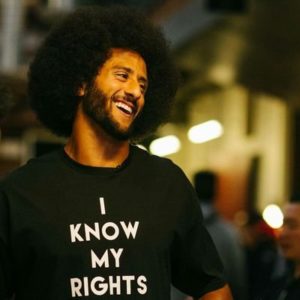 In the recent discussion about San Francisco 49ers ex-QB Colin Kaepernick’s extended vacation, the focus has been much more on the politics of the situation than what he would likely contribute on the field. Some thoughts on the latter are in order.
In the recent discussion about San Francisco 49ers ex-QB Colin Kaepernick’s extended vacation, the focus has been much more on the politics of the situation than what he would likely contribute on the field. Some thoughts on the latter are in order.
The Kap who came within five yards of adding a sixth Lombardi Trophy to the 49ers’ collection is long gone. If that Kap were still with us, the 49ers would never have let him go. It’s still something of a mystery as to how he started his career so dazzlingly and later flamed out equally spectacularly, but the closest we have to a thorough explanation came from NFL Hall-of-Fame quarterback Kurt Warner, who worked with Kap a couple of off-seasons ago to try to help him iron out his issues. Unlike some who thought Kap’s attitude and work ethic were suspect, Warner was nothing but complimentary of Kap in that regard. The problem, as Warner saw it, was that Kap had never learned or ever been expected to develop the skills and instincts of a classic NFL quarterback. The spread and zone-read offenses that Kap played in college and his first two years in San Francisco put much less of a premium on finding open receivers in complicated schemes, and he could make a lot more plays by improvising with his athletic ability. The NFL, with its coaching staffs working 24/7/365 in their film rooms, eventually adjusted and forced Kap and the 49ers to adopt a more traditional approach. As Warner noted, it’s hard enough for a quarterback to succeed in the NFL when he’s versed in the traditional drop-back method since high school. Learning it midway into an NFL career, as Kap was obligated to do, was a daunting task. Three years into the transition, the results spoke pretty clearly that Kap was unlikely to rejoin the ranks of elite NFL quarterbacks. He had become who he was going to be.
Under normal circumstances, however, Kap would still have a job in the NFL, even if he was mostly holding a clipboard on a sideline. The NFL is a next-man-up league, and teams are always in need of injury replacements and backups at every position, particularly quarterback, and Kap could be very effective in such a role if given the opportunity. Think, for example, of how 49er quarterback Steve Young, prior to the Hall-of-Fame portion of his career, gave NFL defenses fits with his speed and improvisation when filling in for Joe Montana, even during playoff games. At the very least, Kap would present a lot of instant adjustment problems for defensive coordinators over the course of a game or two. This was what Ozzie Newsome and John Harbaugh of the Baltimore Ravens had in mind when they expressed interest in signing him, especially since their other alternative at backup quarterback found it hard to complete passes even in practice. They were overridden, however, by their owner, Steve Biscotti, for whom political concerns were a higher priority.
Speaking of which, NFL owners made a very short-sighted decision with their blacklist, informal or otherwise. Somehow, they appear to have forgotten that 75% of NFL players are black, with many of them having likely experienced firsthand the issues with law enforcement that Kap had protested. If the owners thought that Kap was alone in his beliefs, they have come to a rude awakening, especially with an increasing number of white players coming forth to support their teammates. The NFL would have looked a lot better if they had defended Kap’s First Amendment rights over the complaints of the few fans threatening to turn in their season tickets. Instead, the job of protecting the NFL shield looks harder than ever for the owners and their commissioner Roger Goodell. As usual, their problems are mostly self-inflicted.
As for the protests themselves, one of the most enlightening moments on the subject was South Carolina Republican Senator Tim Scott’s speech last year detailing his personal experiences with profiling, including seven incidents during his time on Capitol Hill. Those with any doubts of the legitimacy of the issue can leave them here:
– Vino Knight-Trane


